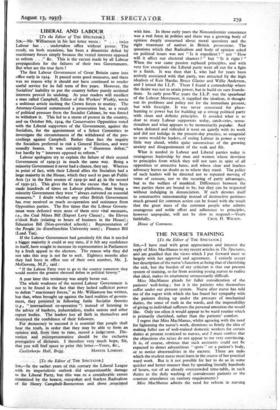LIBERAL AND LABOUR
[To the Editor of THE SPECTATOR.]
Sta,—Mr. Williamson in his last letter wrote : " . . . twice Labour has . . . undertaken office without power. The result, on both occasions, has been a disastrous defeat by reactionary forces simply because the vested interests opposed to reform . . ." &c. This is the excuse made by all Labour propagandists for the failures of their two Governments. But what are the true facts ?
The first Labour Government of Great Britain came into office early in 1924. It passed some good measures, and there was no reason why it should not have continued to render useful service for its full term of five years. However, the Socialists' inability to put the country before purely sectional interests proved its undoing. As your readers will recollect a man called Campbell, Editor of the Workers' Weekly, wrote a seditious article inciting the Crown forces to mutiny. The Attorney-General commenced a prosecution but, as a result of political pressure from the Socialist Cabinet, he was forced to withdraw it. This led to a storm of protest in the country, and on October 8th, 1924, the Conservative Opposition voted with the Liberal supporters of the Government, against the Socialists, for the appointment of a Select Committee to investigate the circumstances of the withdrawal of the pro- ceedings against Campbell. Rather than face the inquiry the Socialists preferred to risk a General Election, and were soundly beaten. It was certainly a " disastrous defeat," but hardly by " interests opposed to reform."
Labour apologists try to explain the failure of their second Government of 1929-31 in much the same way. Being a minority Government it never had a chance, they say. Whereas in point of fact, with their Liberal allies the Socialists had a large majority in the House, which they used to pass 96 Public Acts (51 in the first session of 1929-30 and 45 in the second of 193o-31). This gives the lie to the excuse that has been made hundreds of times on Labour platforms, that being a minority Government they were " always outvoted on essential measures," I doubt whether any other British Government has ever received so much co-operation and assistance from Opposition parties. The five times that the Labour Govern- ment were defeated were none of them over vital measures, i.e., the. Coal Mines Bill (Export Levy Clause) ; the Eleven o'clock. Rule (relating to hours of business in the House) ; Education Bill (Non-provided schools) ; Representation of the People (to disenfranchise University seats) ; Finance Bill (Land. Tax).
If the Labour Government had genuinely felt that it needed a bigger majority it could at any time, if it felt any confidence in itself, have sought to increase its representation in Parliament by a fresh appeal to the electors. The reason why they did not take this step is not far to seek. Eighteen months after they had been in office one of their own number, Mr. J. McGovern, M.P., said : " If the Labour Party were to go to the country tomorrow they would receive the greatest electoral defeat in political history."
A year later this testimony was amply borne out.
The whole weakness of the second Labour Government is not to be found in the fact that they lacked sufficient power to defeat " reactionary forces," as Mr. Williamson has written, but that, when brought up against the hard realities of govern- ment, they persisted in following futile Socialist theories (e.g., " international co-operation ") instead of listening to the advice of bankers, industrialists, trades unions and other expert bodies. The leaders lost 'all faith in themselves and destroyed the confidence of their followers.
For democracy to succeed it is essential that people shall hear the truth, in order that they may be able to form an opinion 'and, from time to time, record a judgement. Dis- tortion and misrepresentation should be the exclusive prerogative of dictators. I therefore very' much hope, Sir, that you will find' space to print this letter.—Yours, &c.,






































 Previous page
Previous page